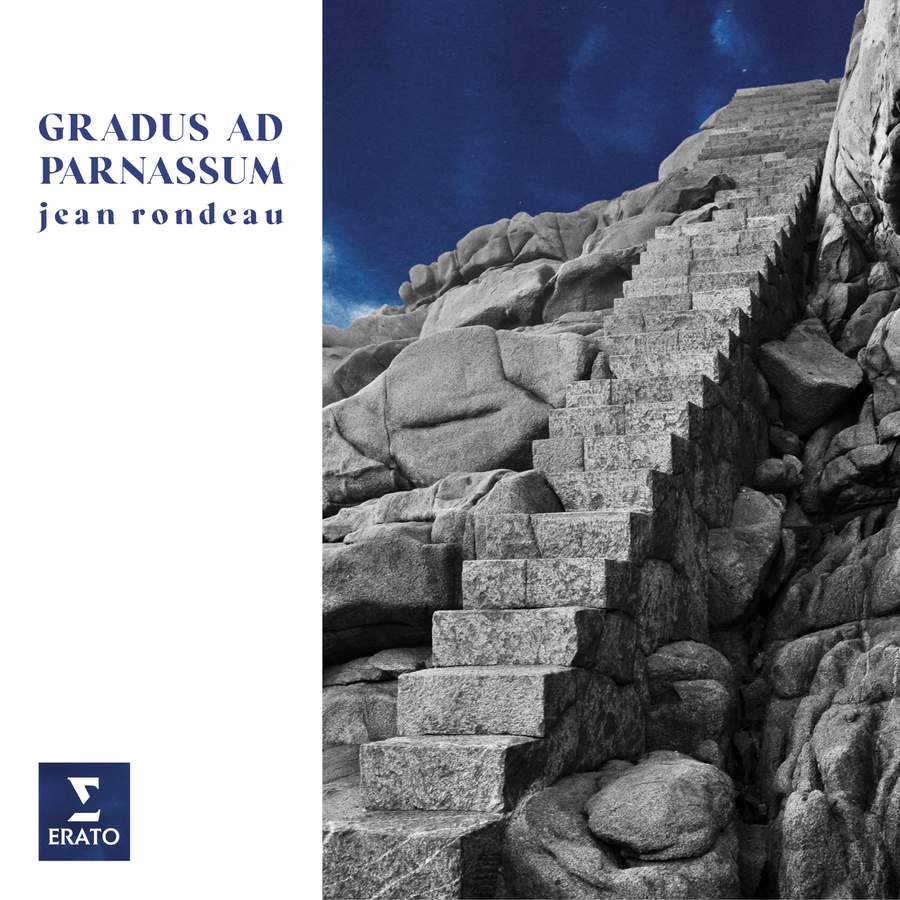Jean Rondeau: Gradus ad Parnassum
View record and artist detailsRecord and Artist Details
Genre:
Instrumental
Label: Warner Classics
Magazine Review Date: 05/2023
Media Format: CD or Download
Media Runtime: 82
Mastering:
DDD
Catalogue Number: 5419 74162-3

Tracks:
| Composition | Artist Credit |
|---|---|
| Ricercar del primo tuono |
Giovanni Palestrina, Composer
Jean Rondeau, Harpsichord |
| Arpeggio and Fugue, Movement: Fugue |
Johann Joseph Fux, Composer
Jean Rondeau, Harpsichord |
| Sonata for Keyboard No. 31 |
Joseph Haydn, Composer
Jean Rondeau, Harpsichord |
| Gradus ad Parnassum, '(The) Art of Playing on the, Movement: No 45 in C Minor, Andante malinconico |
Muzio Clementi, Composer
Jean Rondeau, Harpsichord |
| (2) Preludes through all 12 major keys, Movement: No 2, C major |
Ludwig van Beethoven, Composer
Jean Rondeau, Harpsichord |
| Children's Corner, Movement: Doctor Gradus ad Parnassum |
Claude Debussy, Composer
Jean Rondeau, Harpsichord |
| Prelude |
Ludwig van Beethoven, Composer
Jean Rondeau, Harpsichord |
| Gradus ad Parnassum, '(The) Art of Playing on the, Movement: No 14 in F Major, Adagio sostenuto |
Muzio Clementi, Composer
Jean Rondeau, Harpsichord |
| Fantasia |
Wolfgang Amadeus Mozart, Composer
Jean Rondeau, Harpsichord |
| Sonata for Piano No. 16, Movement: Andante |
Wolfgang Amadeus Mozart, Composer
Jean Rondeau, Harpsichord |
| Ciaconna |
Johann Joseph Fux, Composer
Jean Rondeau, Harpsichord |
| Ricercar del secondo tuono |
Giovanni Palestrina, Composer
Jean Rondeau, Harpsichord |
Author: Lindsay Kemp
Debussy, one suspects, would not have touched a harpsichord with a bargepole. Yet here is ‘Doctor Gradus ad Parnassum’, his amusing skit on his daughter’s piano exercises drifting off into fantasy, played on a copy of an 18th-century German harpsichord. Why, you ask? Because it appears as a natural outcome of Jean Rondeau’s beautifully constructed new album built around the idea of teaching, learning and personal interpretative integrity. Not that he explains that in great detail; we’re largely left to work it out from a booklet note that transmits its message in the form of a Socratic dialogue between master and pupil, the form used by Fux in his famous 1725 counterpoint treatise Gradus ad Parnassum.
Don’t suppose, however, that this is all academic stuff. Rondeau’s thinking is subtler than that. The two Fux pieces – a broadly arpeggiated prelude and a brawny 10-minute Ciaconna – have not a whiff of the schoolhouse, and while Haydn taught himself from Fux’s book, the prevailing influence in the earlyish sonata we get here is the expressive freedom of CPE Bach. The Mozart items are ones familiar to piano learners, as is the name of Clementi, whose own piano exercises also appeared under the name Gradus ad Parnassum. The ones here seem more studies in style than technique, just as Beethoven’s preludes, modulating through all the major keys, seem like try-outs for the composer rather than the performer, and the (attrib) Palestrina ricercars that open and close the programme like exercises in simple but clear contrapuntal playing.
Which Rondeau manages exquisitely, as he does everything in this fascinating recital, from which the overriding lesson to be learnt is just what a flexible and expressive medium the harpsichord can be – perhaps more than any of us had realised before. The Fux is probably the only music for which it would be the first-choice instrument; but Rondeau sweeps away any misgivings by the sheer skill, beauty and resource of his playing, a beguiling combination of sweet touch, loose precision of spread chords and rhythmic dislocations (even in the dogged chords of the Beethoven), the way certain notes are held down in Fux’s Harpeggio to control volume and tone like a sustaining pedal, the delicate tautness and poise of trills and other embellishments which still somehow sing, the unusual variations on repeat, and the way even the unhurried mechanistic quality of K545 is thawed by well-judged rubato (though in truth in other places it may be too much for some). And the Debussy? Well, it’s a triumph, astonishingly even in its ripplings and filled with colours and ideas; the left-hand crossovers at 1'32" sound like interventions from another world. It’s genius really, and this track on its own deserves to be a streaming hit.
Discover the world's largest classical music catalogue with Presto Music.

Gramophone Digital Club
- Digital Edition
- Digital Archive
- Reviews Database
- Full website access
From £8.75 / month
Subscribe
Gramophone Full Club
- Print Edition
- Digital Edition
- Digital Archive
- Reviews Database
- Full website access
From £11.00 / month
Subscribe
If you are a library, university or other organisation that would be interested in an institutional subscription to Gramophone please click here for further information.




